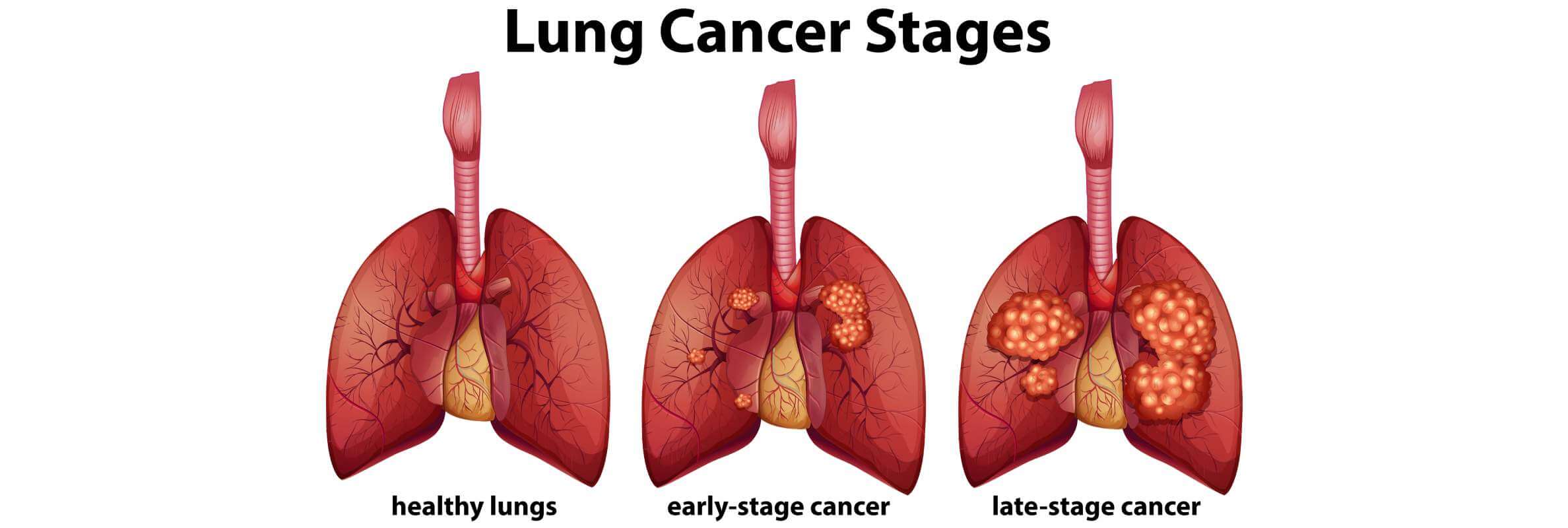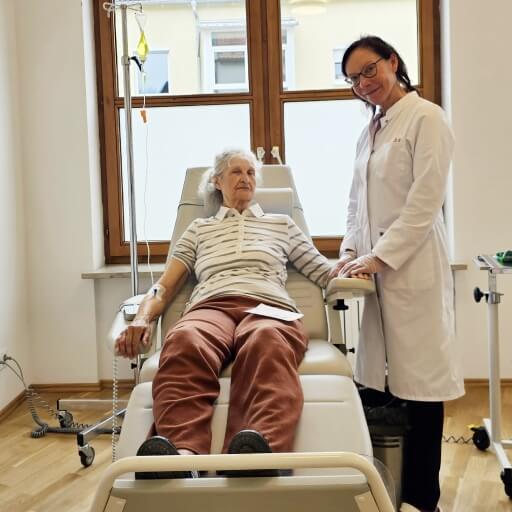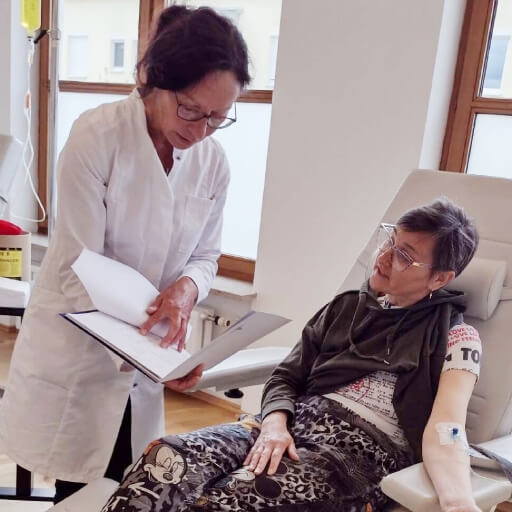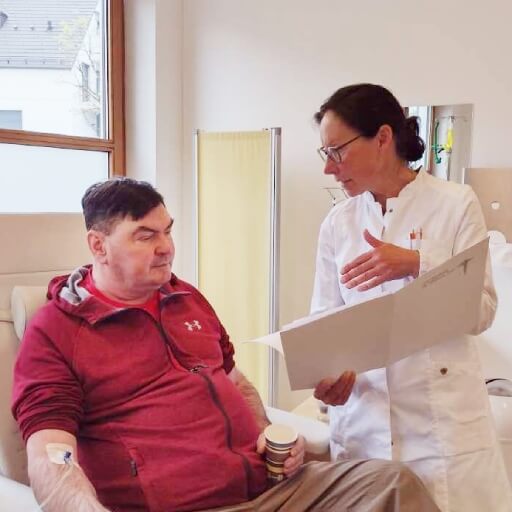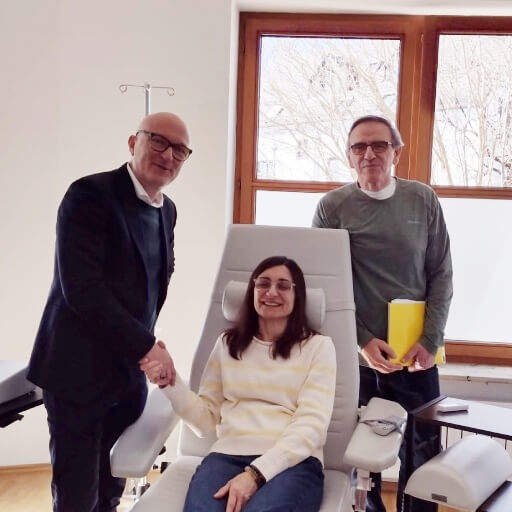المرحلة الرابعة سرطان الرئة، والمعروفة أيضاً بسرطان الرئة النقيلي أو المتقدم، تُشير إلى أن المرض انتشر خارج الرئتين إلى أجزاء بعيدة من الجسم، مثل الكبد، أو الدماغ، أو العظام، أو الرئة الأخرى. غالباً ما ترتبط هذه المرحلة بتوقعات صعبة، لكن التطورات في خيارات العلاج توفر أملاً جديداً للمرضى.
يظل سرطان الرئة أحد أكثر أنواع السرطانات انتشاراً وفتكاً في جميع أنحاء العالم. في عام 2022، كان هناك ما يقرب من 2.48 مليون حالة جديدة و 1.82 مليون حالة وفاة على مستوى العالم، مما يجعله مصدر قلق كبير للصحة العامة. يرجع ارتفاع معدل الوفيات إلى حدٍ كبير إلى التشخيص المتأخر، حيث لا يتم التعرف على العديد من الحالات إلا بعد تقدُم السرطان.
يؤدي الكشف المبكر عن سرطان الرئة إلى تحسين معدلات البقاء على قيد الحياة بشكل ملحوظ. على سبيل المثال، يمكن أن يتجاوز معدل البقاء على قيد الحياة لمدة خمس سنوات في المرحلة IA من سرطان الرئة 90٪. ومع ذلك، يتم تشخيص حوالي 27.4٪ فقط من حالات سرطان الرئة في مرحلة مبكرة. يحدث هذا غالباً لأن المرحلة المبكرة من سرطان الرئة قد لا تُظهر أعراضاً ملحوظة، مما يؤدي إلى تأخير التشخيص والعلاج.
بدون علاج، فإن توقعات المرحلة الرابعة من سرطان الرئة تكون سيئة. قد تختلف أوقات البقاء على قيد الحياة، ولكن تُشير الدراسات إلى أن مرضى المرحلة الرابعة من سرطان الرئة ذو الخلايا غير الصغيرة غير المعالجين قد يعيشون ما بين 5 إلى 12 شهراً، بينما قد يعيش مرضى المرحلة الرابعة من سرطان الرئة ذو الخلايا الصغيرة ما بين 3 إلى 15 شهراً. تؤكد هذه الإحصائيات أهمية تدخلات العلاج الفعالة وفي الوقت المناسب.
كيف يتم تشخيص المرحلة الرابعة من سرطان الرئة؟
تشخيص المرحلة الرابعة من سرطان الرئة يتضمن مجموعة من الدراسات التصويرية، وأخذ عينات من الأنسجة، واختبارات جزيئية لتحديد مدى انتشار السرطان وتوجيه استراتيجيات العلاج الشخصية.
دراسات التصوير
- فحوصات PET/CT: تجمع هذه الفحوصات بين التصوير المقطعي بالإصدار البوزيتروني والتصوير المقطعي المحوسب للكشف عن مناطق نشاط الأيض العالي، مما يُشير إلى احتمال انتشار السرطان خارج الرئتين.
- التصوير بالرنين المغناطيسي MRI: يوفر التصوير بالرنين المغناطيسي صوراً مُفصلة للأنسجة الرخوة، مما يساعد في تحديد النقائل (الانبثاثات) في الدماغ أو النخاع الشوكي.
خزعة الأنسجة
- خزعة الأنسجة: تتضمن إزالة عينة من أنسجة الرئة، غالباً من خلال تنظير القصبات أو الشفط بالإبرة، للفحص المجهري لتحديد الخلايا السرطانية.
- الخزعة السائلة: طريقة أقل غزواً لتحليل الحمض النووي الدوراني للورم (ctDNA) في الدم، مما يوفر معلومات عن الطفرات الجينية ويساعد في مراقبة استجابة العلاج.
الاختبارات الجزيئية والعلامات الحيوية
- اختبار المؤشرات الحيوية: يكتشف الطفرات مثل EGFR و ALK و ROS1 والتي يمكن استهدافها باستخدام علاجات محددة، مما يُحسن فعالية العلاج.
- تعبير PD-L1: يتم تقييمه لتحديد الفائدة المحتملة من العلاج المناعي، حيث أن مستويات PD-L1 الأعلى قد تتنبأ باستجابات أفضل.
الأنواع الفرعية لسرطان الرئة
- سرطان الرئة ذو الخلايا غير الصغيرة (NSCLC): مسئول عن ما يقرب من 85٪ من الحالات، ويُعتبر السرطان الغدي النوع الفرعي الأكثر شيوعاً، وغالباً ما يرتبط بطفرات جينية محددة.
- سرطان الرئة ذو الخلايا الصغيرة (SCLC): شكل أكثر عدوانية ينتشر بسرعة ويتطلب طرق علاج مختلفة.
التشخيص الدقيق من خلال هذه الأساليب يُمكن من تطوير خطة علاج شخصية، مما يزيد من احتمالية العلاج الفعال لعلاج سرطان الرئة في المرحلة 4.
علاجات البروتوكول القياسي: الفوائد والقيود
علاجات المرحلة الرابعة من سرطان الرئة القياسية تهدف إلى السيطرة على تقدُم المرض، وتخفيف الأعراض، وتحسين جودة الحياة.
العلاج الكيميائي يستخدم أدوية سامة للخلايا لاستهداف الخلايا السرطانية سريعة الانقسام وتدميرها. على الرغم من أن العلاج الكيميائي يُقلص حجم الأورام ويُطيل فترة البقاء على قيد الحياة، إلا أنه غالباً ما يُصاحبه آثار جانبية، بما في ذلك التعب، والغثيان، وزيادة خطر الإصابة بعدوى. يختلف متوسط البقاء على قيد الحياة للمرضى الذين يخضعون للعلاج الكيميائي، ولكنه يتراوح عموماً بين 6 إلى 12 شهراً.
العلاج الإشعاعي يتضمن استخدام إشعاع عالي الطاقة لقتل الخلايا السرطانية. في المرحلة الرابعة من سرطان الرئة، يتم استخدامه في المقام الأول لأغراض تلطيفية، مثل تخفيف الألم أو السيطرة على الأعراض مثل النزيف. تسمح تقنيات مثل العلاج الإشعاعي التجسيمي للجسم (SBRT) باستهداف الأورام بدقة، مما يُقلل من الضرر الذي يلحق بالأنسجة السليمة المحيطة.
التدخل الجراحي أقل شيوعاً في المرحلة الرابعة من علاج سرطان الرئة بسبب طبيعة المرض المنتشر على نطاق واسع. ومع ذلك، في حالات مختارة حيث تكون النقائل محدودة، يمكن النظر في إجراءات مثل الاستئصال لإزالة الأورام المعزولة. يعتمد قرار إجراء الجراحة على عدة عوامل، بما في ذلك الصحة العامة للمريض والخصائص المحددة للسرطان.
فرط الحرارة يتضمن رفع درجة حرارة أنسجة الورم لتعزيز فعالية العلاجات الأخرى، مثل العلاج الكيميائي والعلاج الإشعاعي. من خلال زيادة تدفق الدم وأكسجة منطقة الورم، يمكن أن يؤدي فرط الحرارة إلى جعل الخلايا السرطانية أكثر عرضة للتلف.
العلاج المناعي يستخدم جهاز المناعة في الجسم للتعرف على الخلايا السرطانية ومهاجمتها. وقد أثبتت التجارب السريرية أن الجمع بين عوامل العلاج المناعي يمكن أن يُحسن معدلات البقاء على قيد الحياة لدى المرضى المصابين بـ NSCLC المتقدم.
على الرغم من أن علاجات المرحلة الرابعة من سرطان الرئة القياسية تُقدم فوائد، إلا أنها لها أيضاً قيود، بما في ذلك الآثار الجانبية واختلاف الفعالية بين الأفراد. نتيجة لذلك، هناك اهتمام متزايد بالعلاجات المبتكرة التي توفر أساليب أكثر تخصيصاً واستهدافاً لعلاج المرحلة الرابعة من سرطان الرئة.
الأساليب الألمانية المتقدمة لعلاج المرحلة الرابعة من سرطان الرئة
تبرُز ألمانيا كدولة رائدة عالمياً في العلاج المتقدم لسرطان الرئة في المرحلة الرابعة، حيث تُقدم علاجات مبتكرة ورعاية شاملة تجتذب المرضى حول العالم.
العلاج بالخلايا المتغصنة
العلاج بالخلايا المتغصنة يمثل تقدُماً كبيراً في العلاج المناعي الشخصي وعلاج سرطان الرئة في المرحلة الرابعة. الخلايا المتغصنة هي خلايا محورية مقدمة للمستضد، تُنشئ وتُنظم الاستجابات المناعية التكيفية. في العلاج بالخلايا المتغصنة، يتم استخراج الخلايا المتغصنة الخاصة بالمريض، وزراعتها وتعريضها لمستضدات خاصة بالورم في المختبر. يتم بعد ذلك إعادة إدخال هذه الخلايا الأولية في المريض، بهدف تحفيز هجوم الخلايا التائية الواسطة T cell-mediated على الخلايا السرطانية. تم إجراء العمل التأسيسي على الخلايا المتغصنة بواسطة عالم المناعة الكندي رالف ستاينمان، الذي اكتشف هذه الخلايا في عام 1973. ألقى بحثه الرائد الضوء على دور الخلايا المتغصنة في المناعة التكيفية، مما أكسبه جائزة نوبل في علم وظائف الأعضاء أو الطب في عام 2011. يتم تعزيز فعالية العلاج بالخلايا المتغصنة كعلاج جديد للمرحلة الرابعة من سرطان الرئة من خلال تحديد العلامات الحيوية المحددة ومستضدات الورم الفريدة لكل مريض. يضمن هذا التخصيص أن الاستجابة المناعية موجهة بدقة ضد الخلايا السرطانية، مما يؤدي إلى احتمالية تحسين نتائج العلاج وتقليل الآثار الضارة.
الأشعة التداخلية
الأشعة التداخلية (IR) أحدثت ثورة في مشهد علاج المرحلة الرابعة من سرطان الرئة. تُعد أحدث علاج للمرحلة الرابعة من سرطان الرئة مفيداً بشكلٍ خاص للمرضى غير المُرشحين للجراحة أو العلاجات الجهازية.
- العلاج الإشعاعي التجسيمي للجسم (SBRT): يوصل SBRT جرعات عالية من الإشعاع للأورام بدقة تصل إلى أقل من المليمتر على مدى بضع جلسات. تُعتبر هذه التقنية فعالة بشكلٍ خاص في علاج أورام الرئة الصغيرة والمحددة بشكلٍ جيد. أظهرت الدراسات أن SBRT يُحقق معدلات سيطرة موضعية تصل إلى 92٪ في ثلاث سنوات و 39٪ في خمس سنوات، متفوقاً على العلاج الإشعاعي التقليدي في نتائج البقاء على قيد الحياة طويلة الأمد.
- نظام ®السايبر نايف: CyberKnife® System عبارة عن منصة SBRT روبوتية تتعقب حركة الورم في الوقت الفعلي، مما يسمح بتوصيل الإشعاع بدقة حتى أثناء تنفس المريض. تُعتبر هذه التقنية مفيدة بشكل خاص لعلاج الأورام الموجودة بالقرب من الهياكل الحرجة في الصدر، مما يوفر خياراً فعالاً للمرضى الذين يعانون من أورام الرئة غير القابلة للجراحة.
- الاجتثاث بالترددات الراديوية (RFA): يتضمن الاجتثاث بالترددات الراديوية إدخال مِسبار probe يُشبه الإبرة في الورم لتوصيل الحرارة التي تولدها الموجات الراديوية، مما يؤدي إلى تدمير الخلايا السرطانية بشكل فعال. يتم تنفيذ هذا الإجراء عادةً تحت إشراف التصوير وهو مناسب للمرضى الذين يعانون من أورام صغيرة أو أولئك الذين لا يستطيعون الخضوع للجراحة. أظهر RFA معدلات اجتثاث كاملة بنسبة 80-90٪ في مرضى مختارين.
- الاجتثاث بالميكروويف (MWA): يستخدم الاجتثاث بالميكروويف الموجات الكهرومغناطيسية لتوليد الحرارة، مما يؤدي إلى تدمير الأنسجة السرطانية بشكل فعال. على عكس الاجتثاث بالترددات الراديوية، لا يعتمد الاجتثاث بالميكروويف على التوصيل الكهربائي، مما يسمح بمناطق اجتثاث أكبر وأسرع. تُعتبر هذه الطريقة فعالة بشكلٍ خاص في علاج الأورام الأكبر حجماً وتلك الموجودة بالقرب من الأوعية الدموية، حيث تعمل على تقليل تأثير "المُشتت الحراري" الذي يمكن أن يؤثر سلباً على فعالية العلاج. يتم إجراء الاجتثاث بالميكروويف عادةً تحت إشراف التصوير، مما يضمن استهدافاً دقيقاً للورم مع تقليل الضرر الذي يلحق بالهياكل المجاورة.
- الاجتثاث بالليزر: يستخدم الاجتثاث بالليزر طاقة ضوء مُركّزة لتسخين الأنسجة السرطانية وتدميرها. تُعتبر طريقة العلاج هذه للمرحلة الرابعة من سرطان الرئة أقل شيوعاً ولكنها يمكن أن تكون فعالة في بعض مواقع وأحجام الورم. غالباً ما يتم النظر في ذلك عندما لا تكون تقنيات الاجتثاث الأخرى ممكنة.
- الاجتثاث بالتبريد: يتضمن الاجتثاث بالتبريد تطبيق برودة شديدة لتجميد الخلايا السرطانية وتدميرها. يتم إدخال مِسبار probe إلى الورم تحت إشراف التصوير، ويتم استخدام غاز الأرجون لإنشاء "كرة ثلجية" تُحيط بالورم. تُعد هذه التقنية
- مفيدة للأورام الموجودة بالقرب من الهياكل الحساسة لأن عملية التجميد أقل عرضة لإتلاف الأنسجة المحيطة. بالإضافة إلى ذلك، تكون كرة الثلج مرئية في التصوير، مما يسمح بمراقبة منطقة الاجتثاث في الوقت الحقيقي. يرتبط الاجتثاث بالتبريد بأقل قدر من الألم وانخفاض خطر حدوث مضاعفات، مما يجعله مناسباً للمرضى الذين لا يستطيعون تحمل علاجات أكثر عدوانية.
- العلاج الكيميائي الكهربائي (ECT): يجمع العلاج الكيميائي الكهربائي بين العلاج الكيميائي والنبضات الكهربائية لتعزيز امتصاص الخلايا السرطانية للدواء. بعد إعطاء العامل الكيميائي العلاجي، يتم تطبيق نبضات كهربائية قصيرة ومكثفة على منطقة الورم، مما يؤدي إلى زيادة قابلية نفاذ غشاء الخلية والسماح لمزيد من الدواء بالدخول إلى الخلايا. تُعتبر هذه الطريقة مفيدة بشكلٍ خاص للأورام الموجودة بالقرب من الهياكل الحيوية، لأنها تُقلل من الضرر الذي يلحق بالأنسجة المحيطة. أظهر العلاج الكيميائي الكهربائي نتائج واعدة في الحالات التلطيفية، حيث أدى إلى تحسين السيطرة الموضعية على الورم وتحسين جودة حياة المريض.

- الانصمام الكيميائي عبر الشرايين (TACE): الانصمام الكيميائي عبر الشرايين هو إجراء يتم فيه توصيل أدوية العلاج الكيميائي مباشرةً إلى الشرايين التي تُغذي الورم، يليها حقن عوامل صمية لمنع تدفق الدم. يعمل هذا النهج المزدوج على حبس العلاج الكيميائي داخل الورم ويحرمه من العناصر الغذائية، مما يُعزز فعالية العلاج. كعلاج جديد لسرطان الرئة في المرحلة الرابعة، يُعد TACE مفيداً بشكل خاص للمرضى الذين يعانون من أورام غير قابلة للجراحة أو العلاج الكيميائي الجهازي. كما يمكن دمجه مع علاجات أخرى، مثل العلاج المناعي أو العلاج الإشعاعي، لتحسين النتائج.
البروفيسور كوفاتش: لماذا ضاعفت تقنية TACE معدل البقاء على قيد الحياة لمرضى السرطان – ما يحتاج المرضى إلى معرفته
مزايا تقنيات الأشعة التداخلية
- الدقة: العلاج الموجه يُقلل من التعرض للأنسجة السليمة.
- آثار جانبية أقل: انخفاض خطر حدوث المضاعفات مقارنةً بالعلاجات الجهازية.
- إجراءات في العيادات الخارجية Outpatient: يتم تنفيذ العديد من علاجات الأشعة التداخلية IR في العيادات الخارجية outpatient، مما يُقلل من مدة الإقامة في المستشفى.
- إمكانية التكرار: يمكن تكرار الإجراءات إذا لزم الأمر، مما يوفر مرونة في تخطيط العلاج.
من خلال دمج تقنيات الأشعة التداخلية IR المتقدمة هذه في بروتوكول العلاج، يمكن للمرضى الذين يعانون من المرحلة الرابعة من سرطان الرئة الوصول إلى خيارات فعالة، وأقل غزواً يمكنها تحسين جودة الحياة وربما إطالة فترة البقاء على قيد الحياة.
| نوع العلاج | معدل البقاء على قيد الحياة لمدة عامين | معدل الاستجابة | المدة | الآثار الجانبية |
|---|---|---|---|---|
| العلاجات القياسية | ~٪25 للسرطان المتقدم | أقل من 10٪ | عدة دورات | شديدة (غثيان، وتعب، وتساقط الشعر، وكبت المناعة، وتهيُج الجلد) |
| الأساليب المبتكرة | ~٪60 للسرطان المتقدم | ٪65-45 | حتى 4 جلسات | خفيفة (شعور موضعي بعدم الارتياح) |
*بيانات Booking Health
قصص حقيقية: مرضى تغلبوا على الصعاب
القصص الواقعية للمرضى الذين واجهوا المرحلة الرابعة من سرطان الرئة تُقدم الأمل والإلهام، مما يُظهر التطورات في العلاج ومرونة الروح البشرية.
كيجان مورفي: من التشخيص إلى الهدأة
في عمر 41 عاماً، تم تشخيص كيجان مورفي، وهو رجل إطفاء متقاعد ومحارب قديم، بالمرحلة الرابعة من السرطان الغدي في الرئة والذي انتشر إلى العقد اللمفاوية، والأضلاع، والبطن. كشفت الاختبارات الجينية عن طفرة إيجابية لـ ALK، مما جعله مُرشحاً للعلاج الموجه. تحت رعاية المتخصصين الألمان، بدأ كيجان العلاج باستخدام مثبط ALK. ومن اللافت للنظر أنه في غضون شهرين، انخفضت الأورام الخاصة به بنسبة 50٪. سمحت هذه الاستجابة الكبيرة بالتدخل الجراحي، ولم تُظهر التقارير المرضية اللاحقة أي دليل على المرض.
رحلة إد سميث: التغلب على نقائل الكبد
إد سميث، الزوج والأب، تلقى تشخيصه بالمرحلة الرابعة من سرطان الرئة ذو الخلايا غير الصغيرة بعد أن كشف فحص صحي روتيني عن وجود كتلة في كبده. في البداية، عولج باستخدام نظام العلاج الكيميائي المكون من ثلاثة أدوية، لكن واجه إد تحديات مع تقدُم السرطان. بحثاً عن بدائل، إلتحق بالمرحلة الأولى من التجربة السريرية للعلاج المناعي. على الرغم من الآثار الجانبية الأولية، أدت تجربة لاحقة إلى نجاح وتحسُن كبير في حالته. اعتباراً من أبريل 2022، أُعلن أن إد "ليس لديه دليل على المرض" ويستمر في التحسُن، بعد ما يقرب من عقد من تشخيصه الأولي.
الحياة بعد التشخيص: قوة الرعاية الشخصية
لا شك أن تشخيص المرحلة الرابعة من سرطان الرئة يمثل تحدياً كبيراً، ولكن من المهم أن نفهم أنه لا يعني نهاية فورية. أحدثت التطورات في الرعاية الشخصية تغييراً جذرياً في نظرة العديد من المرضى، مع التركيز على تحسين جودة الحياة وإطالة فترة البقاء على قيد الحياة.
يتم تصميم خطط العلاج الشخصية مع الأخذ بعين الاعتبار التركيبة الجينية الفريدة للمريض، وأسلوب حياته، وصحته العامة. يضمن هذا النهج أن تكون العلاجات مُصممة لاستهداف الخصائص المحددة للسرطان، مما قد يؤدي إلى نتائج أكثر فعالية وآثار جانبية أقل. من خلال مواءمة استراتيجيات العلاج مع الاحتياجات الفردية، غالباً ما يشعر المرضى بتحسُن في الصحة وجودة حياة أفضل.
في حين أن المرحلة الرابعة من سرطان الرئة تمثل تحديات خطيرة، فإن العديد من المرضى يجدون القوة والأمل من خلال خطط الرعاية الشخصية التي تُعطي الأولوية لقيمهم وتفضيلاتهم. من خلال التركيز على العلاجات التي تتوافق مع الأهداف الفردية، يمكن للمرضى الحفاظ على الشعور بالسيطرة والكرامة طوال رحلتهم العلاجية. بفضل دعم فرق الرعاية الصحية المتخصصة، يتمكن المرضى من اتخاذ قرارات مستنيرة تعكس رغباتهم وتحسُن تجربتهم الشاملة.
علاج السرطان المتقدم: قصص نجاح المرضى مع Booking Health
إدارة المرحلة الرابعة من سرطان الرئة في الوقت المناسب مع Booking Health
البحث عن أفضل علاج للمرحلة الرابعة من سرطان الرئة يمكن أن يستغرق وقتاً طويلاً ويستنزف عاطفياً بشكل لا يصدق. إن الخيارات المحدودة في الطب التقليدي، وقيود التأمين الطبي، وقوائم الانتظار الطويلة، وارتفاع تكاليف العلاج تجعل من الصعب العثور على الرعاية المناسبة عندما يكون الوقت هو العامل الأهم. ونتيجة لذلك، يكتفي العديد من المرضى بالخيار الأول المتاح، ليكتشفوا بعد ذلك أنه أقل فعالية أو تكلفة العلاج أكثر مما توقعوا.
لتجنُب إضاعة الوقت الثمين أو المساس بجودة الرعاية، توجه إلى Booking Health. باعتبارها مُزود سياحة طبية موثوق به، ساعدت شركة Booking Health أكثر من 100.000 مريض في العثور على استراتيجيات علاج مُخصصة للغاية لعلاج السرطان على مدى السنوات العشر الماضية. وبدلاً من البروتوكولات التي تناسب الجميع، يركز خبراء الشركة على الحلول المُصممة خصيصاً للحالات المتقدمة مثل المرحلة الرابعة من سرطان الرئة.
قد يكون تنظيم العلاج في الخارج أمراً مُرهقاً، خاصةً مع مشاكل التأشيرة، والضرائب الدولية، والتعقيدات اللوجستية. مع Booking Health، يمكنك توفير 40-70٪ مقارنةً بالحجز المباشر مع المستشفيات ومراكز العلاج. يستطيع فريق الشركة أيضاً ترتيب الوصول العاجل إلى المستشفيات الألمانية الرائدة في غضون 48 ساعة.
بدءاً من دعم التأشيرة، وانتقالات المطار، والإقامة إلى خدمات الترجمة بدوام كامل، وتنسيق العلاج، تتعامل شركة Booking Health مع كل التفاصيل. تضمن شراكاتها مع المستشفيات ومراكز العلاج الأكثر شهرة الوصول إلى أحدث التقنيات والابتكارات في الرعاية المتقدمة لسرطان الرئة.
لا تضيع وقتاً ثميناً في التنقل في النظام بمفردك. اسمح لـ Booking Health بإيصالك بسرعة إلى أفضل علاج لسرطان الرئة في المرحلة الرابعة من الطراز العالمي ودعم متعاطف. احصل على استشارة اليوم وابدأ علاج المرحلة الرابعة من سرطان الرئة غداً.
الأسئلة الشائعة حول المرحلة الرابعة من سرطان الرئة
ارسل طلب للعلاجنعم، الهدأة ممكنة. على الرغم من أن الشفاء نادر، فإن العلاجات يُمكن أن تُقلل من حجم الورم، وتُخفف الأعراض، مما يؤدي إلى فترات من الهدأة.
البقاء على قيد الحياة يمثل تحدياً ولكنه قابل للتحقيق. يعيش بعض المرضى لأكثر من خمس سنوات، خاصةً مع خطط العلاج الشخصية.
تعمل الاختبارات الجينية على تحديد الطفرات مثل EGFR أو ALK، مما يوجه استخدام العلاجات المُستهدِفة التي يمكن أن تكون أكثر فعالية ولها آثار جانبية أقل.
تُشير النقائل إلى انتشار السرطان، مما يستلزم علاجات جهازية مثل العلاج الكيميائي أو العلاج المناعي لمعالجة السرطان في جميع أنحاء الجسم.
أدت العلاجات الجديدة لسرطان الرئة في المرحلة الرابعة، مثل العلاجات الموجهة والعلاج المناعي، إلى تحسين النتائج، خاصةً في المرضى الذين لديهم علامات وراثية محددة، مما يوفر معدلات بقاء على قيد الحياة وجودة حياة أفضل.
يتضمن التشخيص اختبارات التصوير (التصوير المقطعي المحوسب CT والتصوير المقطعي بالإصدار البوزيتروني PET)، والخزعات، واختبارات جزيئية لتحديد نوع السرطان ومدى انتشاره.
متوسط العمر المتوقع مع العلاج يختلف عن متوسط العمر المتوقع بدون علاج. حيث يعيش البعض أشهراً، بينما يعيش آخرون سنوات، اعتماداً على عوامل مثل الصحة العامة والاستجابة للعلاج.
يختلف تقدُم المرض، حيث تتقدم بعض أنواع سرطان الرئة بسرعة، بينما يستغرق البعض الآخر سنوات. تُعتبر الفحوصات المنتظمة ضرورية للكشف المبكر.
في الوقت الحالي، هى غير قابلة للشفاء، ولكن العلاجات يمكن أن تساعد في السيطرة على المرض، وإطالة العمر، وتحسين الراحة.
تُعتبر متقدمة وخطيرة، ولكنها ليست مُميته على الفور. يعيش الكثير من الناس حياة ذات معنى مع الرعاية المناسبة.
تشمل الخيارات العلاج الكيميائي، والعلاج الموجه، والعلاج المناعي، والعلاج الإشعاعي، والرعاية التلطيفية، والتي غالباً ما يتم استخدامها جنباً إلى جنب.
قد تشمل الأعراض السعال المستمر، وألم الصدر، وضيق التنفس، والتعب، وفقدان الوزن.
قد يكشف التصوير عن وجود أورام في كلتا الرئتين، أو تراكم السوائل، أو نقائل في أعضاء أخرى.
تعتمد توقعات المرحلة الرابعة من سرطان الرئة على عوامل مثل النوع الفرعي للسرطان، والطفرات الجينية، والصحة العامة، والاستجابة للعلاج.
يتراوح متوسط العمر المتوقع ما بين 4 إلى 13 شهراً، لكن بعض المرضى يعيشون لفترة أطول مع العلاج الفعال.
معدل البقاء على قيد الحياة لمدة خمس سنوات لمرضى سرطان الرئة في المرحلة الرابعة حوالي 5٪، ولكن العلاجات الأحدث تعمل على تحسين هذه الإحصائيات.
العلاجات القياسية تشمل العلاج الكيميائي، والعلاج الموجه، والعلاج المناعي، والعلاج الإشعاعي، المُصممة خصيصاً لحالات الفردية.
الجراحة نادرة ولكنها قد تكون خياراً إذا كانت النقائل محدودة ويمكن الوصول إليها.
كعلاج لسرطان الرئة في المرحلة الرابعة، يمكن للإشعاع أن يُخفف الأعراض، ويُسيطر على نمو الورم، وكثيراً ما يُستخدم بشكل تلطيفي.
يعمل العلاج المناعي على تعزيز قدرة جهاز المناعة على التعرف على الخلايا السرطانية ومهاجمتها، مما يوفر مسار علاج واعد.
نعم، ظهرت العديد من العلاجات المبتكرة لعلاج المرحلة الرابعة من سرطان الرئة. أظهر العلاج المناعي القائم على الخلايا المتغصنة نتائج واعدة في تعزيز البقاء على قيد الحياة بشكلٍ عام والبقاء على قيد الحياة بدون تقدُم المرض عند دمجه مع العلاج الكيميائي في المرضى الذين يعانون من سرطان الرئة ذو الخلايا غير الصغيرة المتقدم. بالإضافة إلى ذلك، توفر تقنيات الأشعة التداخلية مثل العلاج الكيميائي الكهربائي (ECT) والانصمام الكيميائي عبر الشرايين (TACE) خيارات علاجية مُستهدِفة، وتوصيل العلاجات مباشرة إلى الأورام مع تقليل التعرض الجهازي.
أفضل علاج للمرحلة الرابعة من سرطان الرئة مع وجود نقائل في عام 2025 يشمل العلاج بالخلايا المتغصنة Dendritic cell therapy بالاشتراك مع الأشعة التداخلية. تُظهر العلاجات الحديثة للمرحلة الرابعة من سرطان الرئة معدلات بقاء على قيد الحياة لمدة عامين تصل إلى 60٪ مقارنةً بـ 25٪ مع الأساليب القياسية.
نعم، تُسبب الأساليب المبتكرة شعور موضعي خفيف بعدم الارتياح فقط مقارنةً بالآثار الجانبية الشديدة الناجمة عن العلاج القياسي. العلاج الكيميائي مقابل العلاج المناعي للمرحلة الرابعة من سرطان الرئة يُظهر أن العلاج المناعي يوفر تحمُل أفضل وتحسُّن في جودة الحياة عند التعايش مع المرحلة الرابعة من سرطان الرئة وتلقي العلاج.
بالتأكيد. تُحقق الأساليب الحديثة معدلات استجابة تتراوح بين 45-65٪ مقابل أقل من 10٪ مع الأساليب التقليدية. خيارات علاج المرحلة 4 من سرطان الرئة حسب نوع الطفرة، مثل المرضى المصابين بطفرة ALK الإيجابية، تُظهِر استجابات بارزة للعلاجات الموجهة.
تختلف تكلفة علاج سرطان الرئة في ألمانيا عن التكلفة في الولايات المتحدة الأمريكية بشكلٍ كبير. تُقدم ألمانيا باقات علاج شاملة ومبتكرة، كما أن خيارات علاج سرطان الرئة ميسورة التكلفة في أوروبا تُتيح تحقيق وفورات مالية كبيرة مقارنةً بتكاليف الرعاية الصحية المرتفعة في الولايات المتحدة الأمريكية.
نعم، تندرج العديد من العلاجات المبتكرة في ألمانيا ضمن هذا النطاق السعري. يُعد العلاج بالخلايا المتغصنة وإجراءات الأشعة التداخلية خيارات فعّالة من حيث التكلفة.
تُظهِر ألمانيا نتائج ممتازة مع الأساليب المبتكرة، حيث تُحقق معدلات بقاء على قيد الحياة لمدة عامين بنسبة 60٪. يمكن للمرضى توقع خطط رعاية شاملة وفهم ما يجب توقعه من خطة علاج المرحلة الرابعة من سرطان الرئة من خلال الاستشارات الشخصية.
علاج المرحلة الرابعة من سرطان الرئة بدون العلاج الكيميائي يشمل العلاج بالخلايا المتغصنة، وتقنيات الأشعة التداخلية مثل TACE و RFA والاجتثاث بالليزر Laser ablation. توفر هذه البدائل سيطرة فعّالة على الورم بدون الآثار الجانبية التقليدية للعلاج الكيميائي.
توفر Booking Health دعماً شاملاً للوصول إلى العلاج الدولي. فهى تتولى جميع اللوجستيات بدءاً من الوثائق الطبية وحتى الإقامة، وتربط المرضى بأفضل المتخصصين الرائدين الذين يقدمون أحدث خيارات العلاج المتوفرة.
يبلغ معدل البقاء على قيد الحياة لمدة عامين للمرحلة الرابعة من سرطان الرئة حوالي 25٪ مع العلاج القياسي. ومع ذلك، يمكن أن يرتفع المعدل إلى ~60٪ باستخدام أساليب مبتكرة (مثل تقنيات IR، والعلاج المناعي، وما إلى ذلك).
تتضمن البروتوكولات القياسية للمرحلة 4 من سرطان الرئة عادةً عدة دورات من العلاج الكيميائي على مدى أشهر. من ناحيةً أخرى، يمكن إكمال الخيارات المبتكرة في ما يصل إلى 4 جلسات.
يمكن أن تُسبب العلاجات التقليدية للمرحلة الرابعة من سرطان الرئة آثار جانبية جهازية شديدة (مثل غثيان، وتعب، وتساقط الشعر، وقمع المناعة، وما إلى ذلك). في المقابل، يمكن أن تؤدي الأساليب المبتكرة إلى آثار جانبية أخف وموضعية.
ينتشر سرطان الرئة في المرحلة الرابعة إلى أعضاء أخرى ㄧ لذا يجب أن يركز العلاج على السيطرة على الأورام الأولية والنقيلية. في ألمانيا يمكن للعلاج بالخلايا المتغصنة تنشيط جهاز المناعة ضد خلايا السرطان بينما تستهدف الأشعة التداخلية الأورام موضعياً.
أفضل المستشفيات هي تلك التي تستطيع تنسيق الرعاية المُرَكبة المعقدة في مكانٍ واحد. تجمع مراكز أورام الصدر الألمانية بين التصوير الدقيق، وإجراءات الأشعة التداخلية، وعلاجات الخلايا المتغصنة ㄧ مما يسمح للفرق الطبية بتصميم التدخلات العلاجية بما يتناسب مع حجم الورم، وموقعه، وحالة المريض (لضمان أقصى درجات الأمان والفعالية).
تُقدم ألمانيا مزايا فريدة لمرضى المرحلة الرابعة من سرطان الرئة. توفر مراكزها المتخصصة إمكانية الوصول إلى علاجات مبتكرة قائمة على المناعة وموجهة بالصور ㄧ مما يضمن مستوى عالي من الدقة والرعاية الفردية يصعب العثور عليه في معظم الدول الأخرى (تحسين إدارة الورم وجودة الحياة).
اختر العلاج في الخارج وستحصل بالتأكيد على أفضل النتائج!
المؤلفون:
تم تحرير المقال من قبل خبراء طبيين وأطباء معتمدين من مجلس الأطباء الدكتورة ناديجدا إيفانيسوفا و الدكتور بوغدان ميخالنيوك. لعلاج الحالات المشار إليها في المقال، يجب استشارة الطبيب؛ المعلومات الواردة في المقالة ليست مخصصة للتطبيب الذاتي!
سياستنا التحريرية، التي توضح بالتفصيل التزامنا بالدقة والشفافية، متاحة هنا. انقر على هذا الرابط لمراجعة سياساتنا.
المصادر:
اقرأ:
علاج المرحلة الرابعة من سرطان الرئة في ألمانيا
قائمة المقالات:
- كيف يتم تشخيص المرحلة الرابعة من سرطان الرئة؟
- علاجات البروتوكول القياسي: الفوائد والقيود
- الأساليب الألمانية المتقدمة لعلاج المرحلة الرابعة من سرطان الرئة
- قصص حقيقية: مرضى تغلبوا على الصعاب
- الحياة بعد التشخيص: قوة الرعاية الشخصية
- إدارة المرحلة الرابعة من سرطان الرئة في الوقت المناسب مع Booking Health
- الأسئلة الشائعة حول المرحلة الرابعة من سرطان الرئة
لا تعرف من أين تبدأ؟
اتصل بـ Booking Health